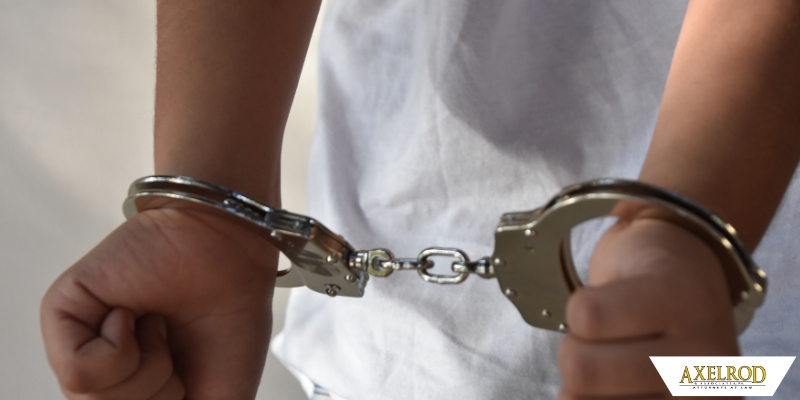4701 Oleander Drive, Suite A
Myrtle Beach, SC 29577
4701 Oleander Drive, Suite A
Myrtle Beach, SC 29577
Myrtle Beach Juvenile Lawyer
Juvenile Criminal Defense Attorneys in Myrtle Beach, SC
The juvenile criminal defense lawyers on the Axelrod team understand that, if your child has been charged with a crime in the juvenile court, you are probably feeling confused, lost, and worried…
Your child may have been released to your custody pending a court date, or they might have been taken into custody by police. What’s next?
Will they stay in jail at the Department of Juvenile Justice? Are they being influenced by other children there and learning how to commit crimes? Will they be taken away from you by the court or sentenced to jail time?
If this is your current situation, stay calm. Your first step in helping your child through this is to call an experienced juvenile criminal defense lawyer who can answer your questions and get your child the legal help and advice that they need.

Why Call Our Myrtle Beach, SC Juvenile Law Attorneys?
Your juvenile criminal defense attorneys at Axelrod and Associates can help you to navigate the stressful and sometimes confusing experience of having a child charged with a crime in SC’s juvenile courts.
Our attorneys know the family courts which is where your child’s case will be heard, we know the criminal courts, and we have represented many children in the juvenile court (juvenile court is family court – the same judges that hear divorces and custody cases also hear juvenile criminal cases).
We care about your child’s wellbeing, and we understand that juvenile criminal defense is not always the same as adult criminal defense – the best interest of the child is always the guiding principle, whether that means using the courts to get help for your child or taking your child’s case to trial with a family court judge.
Your attorney will:
- Meet with you and your child to find out what happened and what your goals are in this case,
- Investigate the allegations against your child, gather evidence that will help their case, and interview any potential witnesses,
- Get and review the evidence that the State will use against your child, and
- Negotiate with the solicitor’s office, DJJ, DSS, and any other agencies that are involved to find the best possible outcome for your child.
My Child was Charged with a Crime – Do I Need a Juvenile Criminal Defense Attorney in Myrtle Beach, SC?
When a minor is charged with a crime in SC’s juvenile courts, they must have a juvenile criminal defense lawyer. It’s not optional – the juvenile cannot represent themselves as adults can in criminal court.
If you do not retain a juvenile criminal defense attorney, the court will automatically appoint a juvenile public defender to represent your child.
Juvenile Offenses in Myrtle Beach, SC
Defending a minor against a juvenile criminal offense is more than just avoiding penalties; it is about protecting a young person’s future. Our attorneys provide vigorous and skillful legal defense for families of adolescents charged with criminal juvenile offenses in communities throughout South Carolina.
At Axelrod & Associates, P.A., we always remember that a single mistake doesn’t make your child a criminal. A juvenile criminal record can affect your child in so many ways. If your child is found guilty of a juvenile criminal offense, your child may have difficulty finding a job, finding a place to live and obtaining scholarship money for college.
Examples of juvenile criminal offenses include:
- DUI, alcohol charges
- Date rape
- Truancy
- Assault
- Shoplifting, theft, check forgery
- Minor possession of alcohol and/or drugs
- Simple possession, marijuana and/or cocaine
- Runaways
- Juvenile sex crimes
Adolescents can make mistakes. If your child has been charged with a juvenile offense, contact us today and let us help you get the justice you deserve. In addition to minimizing the criminal penalties of the juvenile crime you or a loved one faces, we may be able to assist you with pretrial intervention (also known as PTI). PTI allows the juvenile to complete a determinate amount of community service, pay any restitution owed and receive extensive counseling. Upon successful completion of PTI, many juvenile criminal charges can be expunged/wiped clean from their criminal record.
FAQs About South Carolina Juvenile Law
If your child has been charged with a crime in juvenile court, you have questions.
Below, we provide some general information, but you should contact a Myrtle Beach juvenile criminal defense attorney immediately to discuss the specifics of your child’s case and to find out what your options are.
What Rights do Children Have if They are Charged with a Crime?
Juveniles are not given all the constitutional rights that adults have when charged with a crime. They do have the right to remain silent, the right to testify in their own defense, the right to subpoena witnesses or other evidence, the right to cross-examine the witnesses against them, the right to proof beyond a reasonable doubt, and the right to a trial.
Juvenile defendants do not have the right to a jury trial, however. If they take their case to trial, it will be a bench trial, and a family court judge will make the final decision in their case.
Why is My Child’s Criminal Case in the Family Court?
Technically, a juvenile defendant is not found “guilty” and does not “plead guilty” to the charges against them. If they are convicted at trial or if they admit the charges against them, they are “adjudicated delinquent,” and then the court will decide what the appropriate sentence should be.
In the juvenile court, as in other family court cases involving children, the overriding principle that the family court judge must follow is: What is in the best interest of the child?
The idea (right or wrong) is that the family court is best equipped to help children – whether that involves punishment, correction, treatment, or provision of services to help the juvenile rehabilitate and to change the problem behaviors.
My Child was Charged with a Crime – What is the Potential Punishment?
Even after a juvenile has been adjudicated delinquent of a crime, the court must ask: What is in the best interest of the child?
Depending on the charges, the facts of the case, and the juvenile’s circumstances, the court could impose a sentence ranging from a fine or probation to incarceration at the Department of Juvenile Justice (DJJ) until their 21st birthday.
In most cases, the court will order an evaluation before imposing sentence – the evaluation could be a “home evaluation” where the juvenile stays at home while seeing a counselor, or the juvenile could be ordered to an “evaluation center,” where they will be incarcerated for a month or longer as counselors complete the evaluation.
Either way, the juvenile will return to court for a sentencing hearing where the judge will hear the recommendations contained in the evaluation and hear from the prosecutor, DJJ, DSS, and the juvenile’s defense lawyer before deciding on a sentence.
If the juvenile is placed on probation, there may be additional conditions of probation that you would not ordinarily see in an adult’s probation conditions, like counseling, letters of apology, and other recommendations from the juvenile’s evaluation that are designed to help the child end the problem behaviors.
In some cases where there are problems with the child’s home environment, the court may order a DSS home study and potential placement with another relative or at a group home.
Can a Juvenile Defendant Get PTI?
Although PTI is not available to juveniles, the Horry County Solicitor’s Office does have juvenile diversion programs that may be available to your child, including:
- The Juvenile Arbitration Program (JAP): involves payment of restitution if applicable, community service, educational programs, counseling, written essays, and an apology to the victim in their case when applicable,
- The CHANGE Program: involves a “life skills education program,” an “impact of crime writing assignment,” and payment of restitution if applicable, and
- The Juvenile Diversion Program (JDP): involves church attendance, payment of restitution, counseling, written reports, community service, letters of apology, drug tests, and life skills education.
When the program is completed, the charges are dismissed. If the juvenile does not successfully complete the program, their case is referred back to the family court for prosecution.
When are Children Charged as Adults in SC?
A child in SC will be charged as an adult automatically – in General Sessions Court – if they are 1) at last 16 years old, and 2) they are charged with a class A, B, C, or D felony or if the charges carry a maximum penalty of 15 years or more.
Some children can be charged as an adult when they are as young as 14 – for example, if they are charged with murder. In some cases, we can ask for a “waiver hearing” to ask the court to send the child’s case back to the family court for adjudication.
My Child was Arrested – How Do I Get a Bond Hearing?
When a juvenile is charged with a crime in SC, they should be released to the custody of their parents unless 1) the arresting officer believes that they are a danger to themselves or the community, or 2) there is no responsible guardian to which they can be released, in which case DSS will be notified.
Juveniles must be housed at a DJJ facility instead of the county jail where adult defendants are held.
There must be a detention and probable cause hearing within 48 hours of the arrest, where a family court judge will determine whether there was probable cause for the arrest and whether the child should be released.
If the child is not released, a second detention hearing must be held within 10 days after the initial probable cause and detention hearing.
If I Hire You for My Child’s Case, Who Do You Represent? Me or My Child?
Although it is usually the child’s parents or another family member who retain the child’s attorney, the juvenile defense lawyer’s client is the juvenile, not the parent or guardian.
The attorney must act in the child’s best interest, even when that conflicts with the parents’ wishes, but the attorney should also consult with the child’s parents or guardian before making any major decisions.
This also means that there will be times when the attorney must speak with the juvenile outside the presence of the parents or guardian, 1) to preserve attorney-client confidentiality, and 2) to ensure the juvenile client feels comfortable and can speak freely about what happened and what their wishes are.
In some cases, where the juvenile’s interests are adverse to the parents’, the court may appoint a guardian ad-litem who can speak for the child and advocate for the child’s best interests.
GOT AXELROD?
If your child has been charged with a crime or has been detained by police, get help immediately from an experienced juvenile defense lawyer in Myrtle Beach on the Axelrod team.
Call now at 843-916-9300 or complete our contact form to set up an initial consultation.
Need help? Contact Axelrod & Associates, P.A.

Request your
Consultation
The fields marked with * are mandatory.






